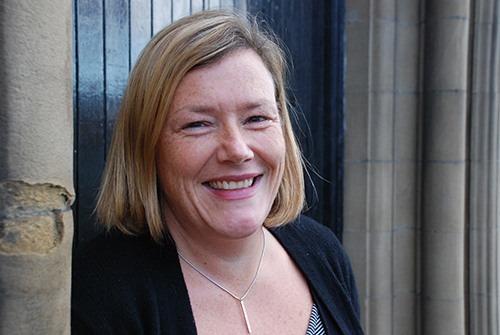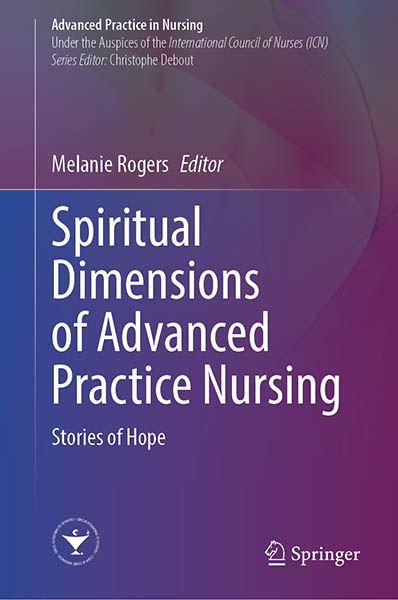Improving patient care by widening awareness of spirituality for health and social care clinicians is at the heart of a ground-breaking new book from the University of Huddersfield’s Professor Melanie Rogers.
Spiritual Dimensions of Advanced Practice Nursing - Stories of Hope identifies how all clinicians can integrate spirituality into their practice. Even something as simple as asking a patient about their family, pets or their work can be a small act of kindness that builds connection and can help improve their wellbeing in the face of the stress of a hospital stay.
The book draws upon on Professor Rogers’ own experiences as an Advanced Nurse Practitioner (APN), as well as case studies from around the world from Advanced Practice Nurse which will help clinicians recognise how simple it can be to integrate spiritualty into their practice.
Finding hope, meaning and purpose
“If you ask someone what they think spirituality is, a lot of people conflate it straight away with religion,” Professor Rogers suggests. “they are two differing concepts with some overlapping qualities. For example, if somebody has a faith this will often overlap with their spirituality. However, spirituality is much broader as it concerns what gives each of us hope, meaning and purpose. For some it might be a pet, or work, or relationships that give hope, meaning and purpose.”
Professor Rogers identifies that COVID-19 has shone a light on how many in society faced imposed isolation on top of the isolation that was already there for many, especially the elderly.
“Each of us has a role in connecting with those around us,” she adds, “and I hope I can remind people that as health and social care professionals we have a major role to play in connecting with those in our care. We may be the only person who has contact with a patient, and we need to make every contact we have meaningful.”

Professor Melanie Rogers
School of Human and Health Sciences
... joined the University in 1998 and has been an Advanced Nurse Practitioner (APN) for more than 20 years. Dr Rogers is an influential figure in the development of the APN role globally and in the UK.
Her innovative approach to teaching recently saw Professor Rogers named as a National Teaching Fellow for excellence in higher education, in particular advanced practice and spiritualty.
Her interest in spirituality is a long-standing one, having set up the Spirituality and Compassion special interest group at the University nearly 20 years ago. This group has written widely on aspects of spirituality and conducted multiple research projects. Her new book builds upon her research with a network of international contacts sharing their experiences of spirituality in practice.
“Recently a colleague of mine gave me a wonderful example of how spirituality helped one patient during the early stages of the pandemic,” she continues. “Her patient was very distressed as he had not seen his family in months, so my colleague arranged for his wife and daughter to meet him in the car park, in full PPE, so at least he could see them.
“It may not sound like much, but he told my friend that ‘in all the time of being an in-patient no-one had asked how I was’. That simple action gave him so much hope and enabled him to recover. It is difficult to quantitively measure that but for this patient it gave him strength to continue his recovery.”
Other examples of spirituality may be “a cancer patient asking ‘why me? How will I get through this?’”
“These sorts of existential questions constantly come up in clinical practice. The Spirituality and Compassion Special Interest Group have just finished a piece of research on mental health clinicians and service users’ perceptions of spirituality, where they talk about how important spirituality is. However, respondents in the research acknowledge that it may not be integrated into care, and service users especially noted that spirituality is rarely integrated into care.

“The book includes 13 stories showcasing how APNs interact with their patients. These stories are incredibly powerful as they show the power of spirituality and how important that human connection is.”
Finding the time to listen is vital
One issue that Professor Rogers has come up against throughout her career is that of staff having the time to offer a patient to comfort them or understand their needs when ensuring that the patient’s medical needs are being addressed.
“Targets have to be met, but I qualified in 1989 and the ethos even then was that you didn’t have enough time to sit and talk to your patients.
“My main approach to patient care has always been getting to know my patients, connecting with them as humans and spending time with them even you are doing a task. The stories I have heard from patients throughout my career have led me to realise how important spirituality in holistic care is.
“Spirituality for patients is really important because it is related to what gives them hope, meaning and purpose. Even if we are caring for somebody who is dying, we can’t make them not die but we can give them dignity in death. You can try to bring in hope and meaning to some extent for example ensuring their close ones of with them or ensuring they are pain free.”
Professor Rogers’ book draws on case studies from as far afield as China and Eswatini in addition to her own experiences. Her work will continue to explore the importance of spirituality in future global research projects.
“We recognise that spirituality may be difficult to define, and clinicians sometimes find it complex to integrate into practice. To help clinicians, we have defined Spiritually Competent Practice which involves compassionate engagement with the whole person as a unique human being, in ways which will provide them with a sense of meaning and purpose. Where appropriate, they will be connecting or reconnecting with a community where they experience a sense of well-being, addressing suffering and developing coping strategies to improve their quality of life.
“This includes the practitioner accepting a person’s beliefs and values, whether they are religious in foundation or not and practising with cultural competency.”
{{item.title}} - News Story
